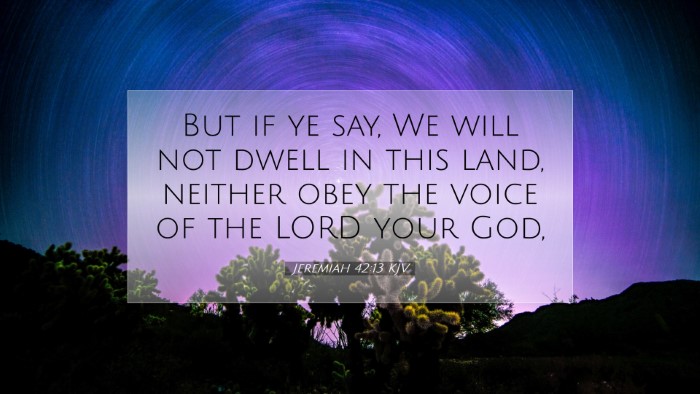Commentary on Jeremiah 42:13
Introduction
Jeremiah 42:13 presents a critical moment in the narrative of the people of Judah after the fall of Jerusalem. The verse encapsulates the plea for a divine directive amidst uncertainty. This commentary draws from various public domain sources, including Matthew Henry, Albert Barnes, and Adam Clarke, to elucidate the theological and practical implications of this verse.
Verse Context
The verse reads: "But if you say, 'We will not stay in this land,' disobeying the voice of the LORD your God." This verse reflects the people's dire situation and their torn loyalties as remnants of Judah grapple with their future following a period of great turmoil.
Exegesis of Jeremiah 42:13
-
The Setting:
Jeremiah’s message comes to a people traumatized by loss and uncertainty. They aim to find safety in Egypt, echoing a recurring theme in Israel's history where reliance on foreign powers leads to spiritual decline. Matthew Henry emphasizes the importance of heeding God's promises over human reasoning.
-
The Plea for Disobedience:
The phrase "We will not stay in this land" reveals the people's internal conflict. Albert Barnes notes that the reluctance to stay demonstrates a lack of faith in God's promise of protection. The temptation to forsake God’s directives for visible security is a recurring biblical theme.
-
The Voice of the LORD:
The reference to the "voice of the LORD" underscores the necessity of divine guidance. Adam Clarke elaborates on the responsibility of the remnant to discern God's will amidst profound external pressures. Ignoring God's voice is equated with disobedience, portraying a serious spiritual dilemma.
Theological Insights
The confession of disobedience manifests a broader theological theme present in Scripture: the struggle between faith and fear. The reluctance to trust in God's promise signifies a failure to recognize His sovereignty over both nations and individual lives.
1. The Nature of Human Propensity:
The desire to flee rather than face potential pain echoes a universal aspect of human behavior—seeking comfort over faith. Matthew Henry's commentary highlights that the inclination to disobey God's intention often follows prevailing societal logic, undermining spiritual guidance.
2. The Call to Faithfulness:
Jeremiah's exhortations serve as a reminder that faithfulness is paramount, even in times of dire consequences. Barnes suggests that God often places His followers in precarious situations to test their faith, reinforcing that His ways are ultimately for our benefit, even if inscrutable at the time.
Practical Applications
For pastors, students, and theologians, Jeremiah 42:13 carries profound implications for contemporary faith practice. The verse serves as a cautionary reminder against seeking refuge in worldly solutions without consulting divine wisdom.
-
Trust in God's Timing:
In moments of desperation, it is quintessential for believers to trust in God's sovereign timings. As evidenced in Jeremiah's ministry, God's strategies may defy human expectations; hence, discernment through prayer and Scripture is vital.
-
The Importance of Obedience:
The call to obedience resonates throughout the biblical narrative. Even when circumstances seem rational for fleeing, believers are encouraged to remain steadfast to their commitment to God’s calling, just as the remnant was urged by Jeremiah.
-
Corporate Reflection:
The consideration for communal faithfulness should lead to collective reflection on faith decisions within congregations, vital in ensuring that churches reflect God’s will over societal pressures. Scholars should encourage their community to seek God’s voice collectively in decision-making.
Conclusion
Jeremiah 42:13 stands as a sober reminder of the struggle between divine obedience and human instinct. For the faithful, especially those in pastoral roles and scholarship, this verse is an invitation to delve deep into understanding God’s guidance amidst chaos. By recognizing the significance of God's voice, one can navigate the complexities of faith and obedience in today’s world, hearkening back to the enduring principles derived from the life and warnings of the Prophet Jeremiah. In doing so, believers not only honor divine direction but also cultivate a more profound spiritual resilience within themselves and their communities.


